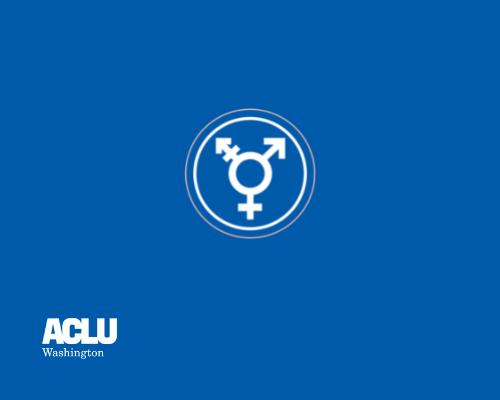
This guide is designed to help transgender individuals understand their legal rights in Washington State.
It is not meant to provide legal advice.
The current legal system assumes individuals identify as one gender, either male or female. While this guide provides an understanding of the current legal system, the ACLU recognizes that many people do not identify as male or female. A person may identify or express as a specific gender, both genders, or neither gender.
The law in this area changes frequently. This guide is current as of June 2025.
HEALTH CARE COVERAGE
Does Washington law protect transgender people from discrimination in health care?
Yes. The Washington Law Against Discrimination (WLAD) prohibits discrimination against transgender people in places of public accommodation, which includes hospitals and other health facilities.[1] Thus, under Washington law, hospitals and clinics may not refuse to treat transgender patients or treat transgender patients differently from other patients because of their gender expression or identity.In addition, the WLAD specifically prohibits discrimination against transgender people in insurance transactions. The Washington Office of the Insurance Commissioner (OIC) can take enforcement action against health carriers who discriminate in health care coverage on the basis of gender identity in violation of state law. For example, OIC fined Aetna Life Insurance Company for refusing to cover breast augmentation surgery for a transgender policyholder. OIC found that Aetna covered the same surgery for cisgender women and that Aetna’s policy was discriminatory to transgender women.
Does Washington state offer additional protections to people seeking or receiving gender-affirming care?
Yes. Washington state law prohibits Washington law enforcement, agencies, and courts from cooperating with out-of-state civil or criminal investigations and legal actions relating to the provision or receipt of gender-affirming care that is lawful in Washington state.[2] Further, in many instances, Washington licensed providers are protected from discipline in Washington for providing gender-affirming care that is consistent with standards of care and legal in Washington, even if another state does take disciplinary action.[3]Finally, under a 2024 Washington state law, many entities will not be allowed to collect, share, or sell an individual’s health care data, including data specifically related to gender-affirming care, without the individual’s consent.[4]
Are there government health care programs that provide coverage for gender-affirming care?
Yes. Washington state’s Medicaid program is known as Washington Apple Health. Apple Health covers many medically necessary surgical and nonsurgical services for transgender individuals. These include services such as gender-affirming hormones, primary care visits, behavioral health visits, and various surgeries.[5] However, even with Apple Health coverage, it may be difficult in Washington to obtain gender-affirming surgeries as there are very few providers willing to accept Apple Health coverage for some of these procedures. Working with a primary care provider and an advocacy organization may assist transgender individuals in finding surgeons willing to accept Apple Health.[1] See RCW 49.60.030 (defining the right to be free from discrimination based on “sexual orientation” in places of public accommodation); RCW 49.60.040 (defining sexual orientation to include gender expression or identity).
[2] Washington State Engrossed Substitute House Bill 1469, 68th Legislature, 2023 Regular Session (effective April 27, 2023), https://lawfilesext.leg.wa.gov/biennium/2023-24/Pdf/Bills/Session%20Laws/House/1469-S.SL.pdf?q=20230918100756. Washington State Senate Bill 5632, 69th Legislature, 2025 Regular Session (effective July 27, 2025), https://lawfilesext.leg.wa.gov/biennium/2025-26/Pdf/Bills/Session%20Laws/Senate/5632.SL.pdf.
[3] Washington State Engrossed Substitute House Bill 1340, 68th Legislature, 2023 Regular Session (effective April 27, 2023), https://lawfilesext.leg.wa.gov/biennium/2023-24/Pdf/Bills/Session%20Laws/House/1340-S.SL.pdf?q=20230918162744.
[4] Washington State Engrossed Substitute House Bill 1155, 68th Legislature, 2023 Regular Session (effective July 23, 2023), https://lawfilesext.leg.wa.gov/biennium/2023-24/Pdf/Bills/Session%20Laws/House/1155-S.SL.pdf?q=20230918125755.
[5] See Washington State Health Care Authority, Transhealth program, https://www.hca.wa.gov/health-care-services-and-supports/apple-health-medicaid-coverage/transhealth-program.




